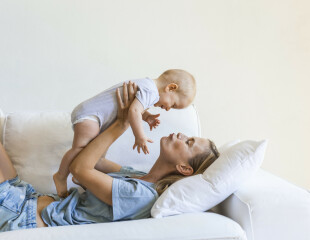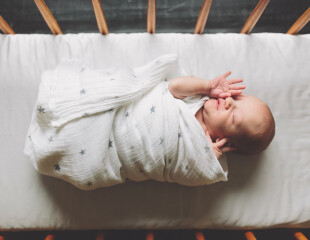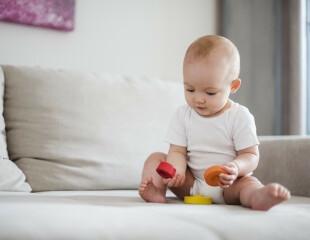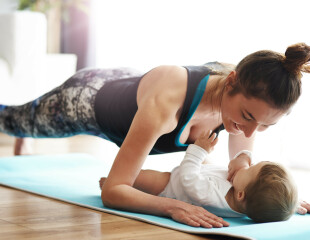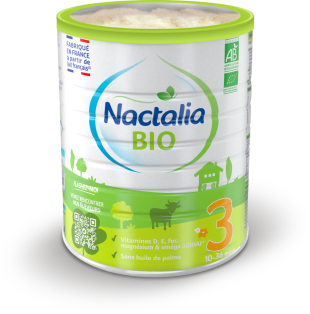
Psychomotor skills
First reflexes, first words, first steps… So many firsts during which baby will evolve and surprise you! Naturally, any change leads to questions: is baby developing normally? Is their development delayed? How can you help them? Let us guide you through the major stages of psychomotor development point by point.
What is psychomotor development ?
Psychomotor development combines psychic development (intellectual, behavioural, sensory, emotional) and motor development (posture, motor skills, coordination). Obviously there are no golden rules as far as this subject is concerned: each child is different and develops at their own rate, so it is pointless worrying!
From 0 to 3 months: the reflex period
At birth, baby’s brain is not yet fully matured. Their environment, relationships and family heredity are all aspects that play a role here.
Baby quickly begins to distinguish contrasts, they become more sensitive to sounds around them and recognise your smell when they are close to you. Their vision becomes more refined, so much so that they are able to look at you directly… this is the moment to reward them with your biggest smile ever! They cannot yet hold their own head up and their movements are, generally speaking, reflexes, and are therefore involuntary. You’ll need to wait a little while yet to see baby doing somersaults…
In the 2nd month, they will delight you by making some vocalisations. By beginning to hold their head up, baby is now able to follow your finger or a slow moving object with their eyes provided that it is at a certain distance from their face.
In the 3rd month, reflex movements slowly make way for the beginnings of voluntary movements. The head is held up straight when baby is supported in a sitting position. This is their 1st acquired postural skill… the start of a very long series !
From 4 to 6 months : boundless energy
Baby can now hold their head up by themselves and turn it in all directions! Burbling and laughter are increasingly frequent. Rolling over onto their sides holds no mysteries for them, neither do their little hands, which they have taken the time to inspect by holding them up close to their face or against each other. An essential discovery for the correct development of “prehension” (the ability to pick up and hold an object in one’s hand).
At 5 months baby is overflowing with energy! They move their arms and legs in an increasingly controlled way. They pick up objects around them, although this can still be a bit clumsy. Increasingly lively, they have fun imitating you and love it when you do it back to them… An opportunity to come up with all kinds of games to enjoy together!
The 6 month marks the beginnings of a sitting position, provided that their back is supported. Baby rolls over in a lying position from their back onto their stomach with no problem at all. Of course, you should always keep an eye on them whilst they are rolling around, and, just between us, we know that you wouldn’t want to miss out on a second of it anyway !
From 7 to 9 months : baby sits well with support
2 months during which baby will learn to sit without support. The sitting position is acquired when their trunk is vertical and their arms help them balance. They continue to explore the world in its lower reaches, as they are not yet able to stand up on their legs. Communication is still limited to gestures, burbling and the beginnings of understanding words and situations, but is in a constant state of evolution and development. Additionally, their fine motor skills become more honed with the appearance of the “thumb-index finger pinch”: perfect for grasping small objects !
From 10 to 12 months: on the move !
Baby is learning to stand up straight, another step achieved! This is not possible unless they have fully mastered the sitting position, so it is pointless rushing them. They begin to formulate their first words. It is from 12 months that they will begin to learn to walk.
Monitoring baby
In a state of constant evolution, it is essential to monitor baby closely to ensure their correct development!
During the first 12 months there are several compulsory visits to the paediatrician:
- An initial examination during their first 24 hours of life, followed by an examination before you both leave the maternity ward. During these examinations baby’s reflexes will be tested, and they will be checked to ensure that they don’t have a heart murmur or any deformations…
- An examination at 2 weeks to check for the possible appearance of certain pathologies..
- A monthly visit from the 1st to the 6th month: baby is weighed and measured and their motor skills, vision and hearing checked. They will be given their vaccinations.
- Four further visits before their first birthday: 6th, 9th 11th and 12th months: visits that are carried out along the same lines as the preceding visits, although more oriented towards language and walking.




